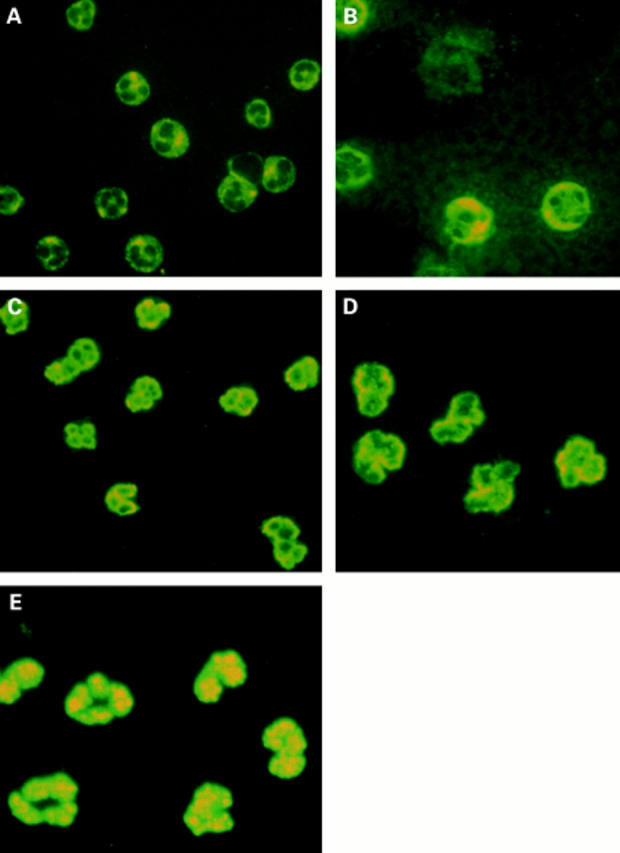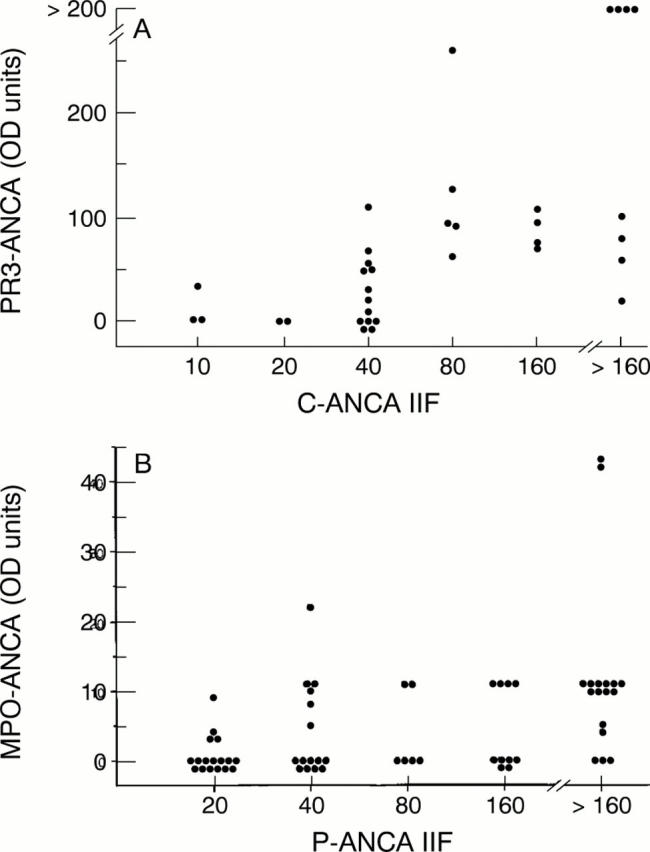Abstract
Background—The "International consensus document on testing and reporting of antineutrophil cytoplasmic antibodies (ANCA)" requires all sera to be examined by indirect immunofluorescence (IIF). However, commercial neutrophil slides are expensive, fluorescence patterns can be difficult to interpret, and coincidental antinuclear antibodies (ANA) cannot be demonstrated; in addition, in house cytospin neutrophil preparations are time consuming to prepare and deteriorate with time.
Aims—To compare the IIF demonstration of ANCA, using washed peripheral blood cell smears, with commercial neutrophil preparations and with ANCA positivity as demonstrated by enzyme linked immunosorbent assay (ELISA).
Methods—Serum fluorescence positivity, pattern, and intensity using washed peripheral blood cell smears were compared with the results obtained using commercial neutrophil slides (INOVA). Fluorescence positivity, pattern, and intensity of 500 sera from consecutive patients with suspected vasculitis tested with washed peripheral blood cells were compared with binding in ELISAs for proteinase 3 (PR3) and myeloperoxidase (MPO).
Results—IIF of washed peripheral blood cell smears detected seven of eight sera with cytoplasmic fluorescence (C-ANCA), and 11 of 12 sera with perinuclear fluorescence (P-ANCA) demonstrated using commercial slides. The two sera that were negative by IIF were also negative in the ELISAs for both PR3-ANCA and MPO-ANCA. Of the 500 sera examined, there were 35 (7%) with C-ANCA, 65 (13%) with P-ANCA, and eight (2%) IIF negative sera that were positive by either ELISA. There was a strong correlation between C-ANCA fluorescence and PR3-ANCA values (p < 0.0001), and a moderate to strong correlation between P-ANCA fluorescence and MPO-ANCA values (p < 0.001) when ANCA fluorescence was demonstrated with washed peripheral blood cell smears.
Conclusions—Washed peripheral blood cells are a convenient and useful low cost alternative to commercial or cytospin neutrophil preparations for the IIF demonstration of ANCA.
Key Words: antineutrophil cytoplasmic antibodies • autoantibodies • indirect immunofluorescence
Full Text
The Full Text of this article is available as a PDF (137.7 KB).

Figure 1 (A) C-ANCA using commercial neutrophil preparation; (B) C-ANCA using peripheral blood smear; (C) P-ANCA using commercial neutrophil preparation; (D) P-ANCA using peripheral blood smear; (E) ANA using peripheral blood smear. These photographs were taken at the same magnification and demonstrate that neutrophils are larger in peripheral blood smears (B, D, and E) than in commercial preparations (A and C) ANA, antinuclear antibodies; ANCA, antineutrophil cytoplasmic antibodies; C-ANCA, cytoplamic ANCA; P-ANCA, perinuclear ANCA.

Figure 2 (A) Correlation between PR3-ANCA binding in ELISA and C-ANCA fluorescence intensity; (B) correlation between MPO-ANCA binding in ELISA and P-ANCA fluorescence intensity. ANCA, antineutrophil cytoplasmic antibodies; C-ANCA, cytoplasmic; P-ANCA, perinuclear; IIF, indirect immunofluorescence; MPO, myeloperoxidase; OD, optical density; PR3, proteinase 3.
Selected References
These references are in PubMed. This may not be the complete list of references from this article.
- Davies D. J., Moran J. E., Niall J. F., Ryan G. B. Segmental necrotising glomerulonephritis with antineutrophil antibody: possible arbovirus aetiology? 1982 Aug 28-Sep 4Br Med J (Clin Res Ed) 285(6342):606–606. doi: 10.1136/bmj.285.6342.606. [DOI] [PMC free article] [PubMed] [Google Scholar]
- Savage C. O., Winearls C. G., Jones S., Marshall P. D., Lockwood C. M. Prospective study of radioimmunoassay for antibodies against neutrophil cytoplasm in diagnosis of systemic vasculitis. Lancet. 1987 Jun 20;1(8547):1389–1393. doi: 10.1016/s0140-6736(87)90591-5. [DOI] [PubMed] [Google Scholar]
- Savige J., Gillis D., Benson E., Davies D., Esnault V., Falk R. J., Hagen E. C., Jayne D., Jennette J. C., Paspaliaris B. International Consensus Statement on Testing and Reporting of Antineutrophil Cytoplasmic Antibodies (ANCA) Am J Clin Pathol. 1999 Apr;111(4):507–513. doi: 10.1093/ajcp/111.4.507. [DOI] [PubMed] [Google Scholar]
- Wang G., Csernok E., de Groot K., Gross W. L. Comparison of eight commercial kits for quantitation of antineutrophil cytoplasmic antibodies (ANCA). J Immunol Methods. 1997 Oct 27;208(2):203–211. doi: 10.1016/s0022-1759(97)00154-3. [DOI] [PubMed] [Google Scholar]
- Wong R. C., Silvestrini R. A., Savige J. A., Fulcher D. A., Benson E. M. Diagnostic value of classical and atypical antineutrophil cytoplasmic antibody (ANCA) immunofluorescence patterns. J Clin Pathol. 1999 Feb;52(2):124–128. doi: 10.1136/jcp.52.2.124. [DOI] [PMC free article] [PubMed] [Google Scholar]
- van der Woude F. J., Rasmussen N., Lobatto S., Wiik A., Permin H., van Es L. A., van der Giessen M., van der Hem G. K., The T. H. Autoantibodies against neutrophils and monocytes: tool for diagnosis and marker of disease activity in Wegener's granulomatosis. Lancet. 1985 Feb 23;1(8426):425–429. doi: 10.1016/s0140-6736(85)91147-x. [DOI] [PubMed] [Google Scholar]


